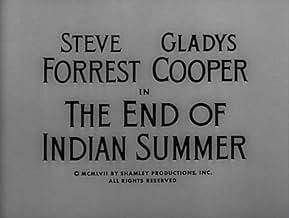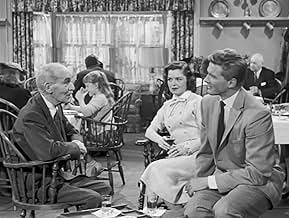An insurance investigator and his wife look into the case of Mrs. Gillespie, who has been widowed twice -- and has twice enjoyed windfalls from her husbands' life insurance.An insurance investigator and his wife look into the case of Mrs. Gillespie, who has been widowed twice -- and has twice enjoyed windfalls from her husbands' life insurance.An insurance investigator and his wife look into the case of Mrs. Gillespie, who has been widowed twice -- and has twice enjoyed windfalls from her husbands' life insurance.
- Director
- Writers
- Stars
- Director
- Writers
- All cast & crew
- Production, box office & more at IMDbPro
Featured reviews
Did she or didn't she?
This is an enjoyable installment of "Alfred Hitchcock Presents"....neither a bad nor a great episode. The twist is okay...the acting very nice. Not much more to say about this one without having any spoilers.
The Computer Would Have Caught It!
Steve Forrest, comedien?
However, the way he delivers his lines at the end makes me think he would have made a good comedic actor as well, the way that Leslie Nielsen made a second career with the Naked Gun and Airplane movies.
Most of the rest of the parts are spot-on, although Joe's wife could have been treated a little better.
If it weren't for seeing so many similar types of shows over the years, the ending would have been more surprising. But it was still a fun episode to watch, for the writing and actors.
COULD I HAVE IT ALL IN ONE LUMP SUM?
In this case, Gladys Cooper plays sweet, old Mrs. Gillespie who has buried --and very quickly -- two husbands, both insured for $50,000 each, netting her quite a windfall in her declining years.
What to do about it. Enter Hitchcock favorite Philip Coolidge (as Sam), an insurance company manager and his lead investigator Joe (played by Steve Forrest). Joe naturally pays a visit to Mrs. Gillespie to find out what sort of a lady she is... and does he have his hands full.
Interestingly, another senior citizen called Howard (played by James Gleason) enters the picture. Watch how all this comes together, which will either surprise the heck out of you or make you laugh out loud.
Clever take on the insurance industry, and/or human nature at its very worst. You be the judge.
Dame Gladys Cooper was nominated three times for an Oscar, no doubt a friend of Hitchcock, also born in England. A treat to see James Gleason, a staple in classic mysteries, usually as the detective.
SEASON 2 EPISODE 22 remastered Universal dvd box set. Released 2007. All seven seasons are now on dvd in a single box set.
Deadly insurance
While not one of my favourite episodes of 'Alfred Hitchcock Presents' or of the season "The End of Indian Summer" is still pretty solid. It is not one of the best episodes of the series directed by Stevens, but it is also not one of the weakest. Personally would put it around high middle, and there is nothing to be ashamed of putting anything in that category. There is a lot done right here, just that other episodes of 'Alfred Hitchcock Presents' did their components better and there is not much exceptional here.
"The End of Indian Summer" has a lot of good. The production values are slick and atmospheric, especially the photography. The audio is suitably ominous, and Bernard Hermann deserves a lot of credit for such an effectively macabre use of Gounod's "Funeral of a Marionette" (which has become quite iconic because of this series), which suits the tone of the series very well.
Moreover, it is well scripted, it doesn't ramble and it isn't cheesy. The story is mostly intriguing and has atmosphere, and benefits from its nice ironic twist. Stevens' direction is more than solid and at its best accomplished, while both Forrest and Cooper give very strong performances in roles perfect for them.
Did feel though that "The End of Indian Summer" was a little lacking in suspense and tension.
As well as a little dragged out later on.
On the whole though, it was a well executed episode. 7/10.
Did you know
- TriviaThe title refers to Indian summer, the informal expression given to a period of sunny, warm weather in late October or early November, after the leaves have turned following an onset of frost but before the first snowfall.
- Quotes
[introduction]
Alfred Hitchcock: [In his customary suit, Hitchcock is wearing a fisherman's hat and holding a fishing rod; he is standing outside a bathtub and fishing in it] Shh! I can't understand it. Of course. How stupid of me. I forgot to put in the water. I must do that at once if I want to catch anything today.
[steps forward and turns on an imaginary tap; we hear the sound of water running]
Alfred Hitchcock: All of this is not as absurdly irrelevant as you think. For if you listen very closely, you will hear the words "bath tub" mentioned in tonight's script. Of course, other topics are mentioned which we could have discussed. For example, the story is about marriage. However, I don't feel that marriage should be discussed on television. It's too controversial. No question about it. We are much safer with a bathtub.
[points downward at it]
Alfred Hitchcock: And now, in a moment, here is tonight's opéra bouffe, "The End of Indian Summer." Like all stories about marriage it has a great deal of romance in it.
[gesticulates to the audience]
Alfred Hitchcock: But watch for that bathtub.
- SoundtracksFuneral March of a Marionette
Written by Charles Gounod
Details
- Runtime
- 30m
- Color
- Aspect ratio
- 1.33 : 1















